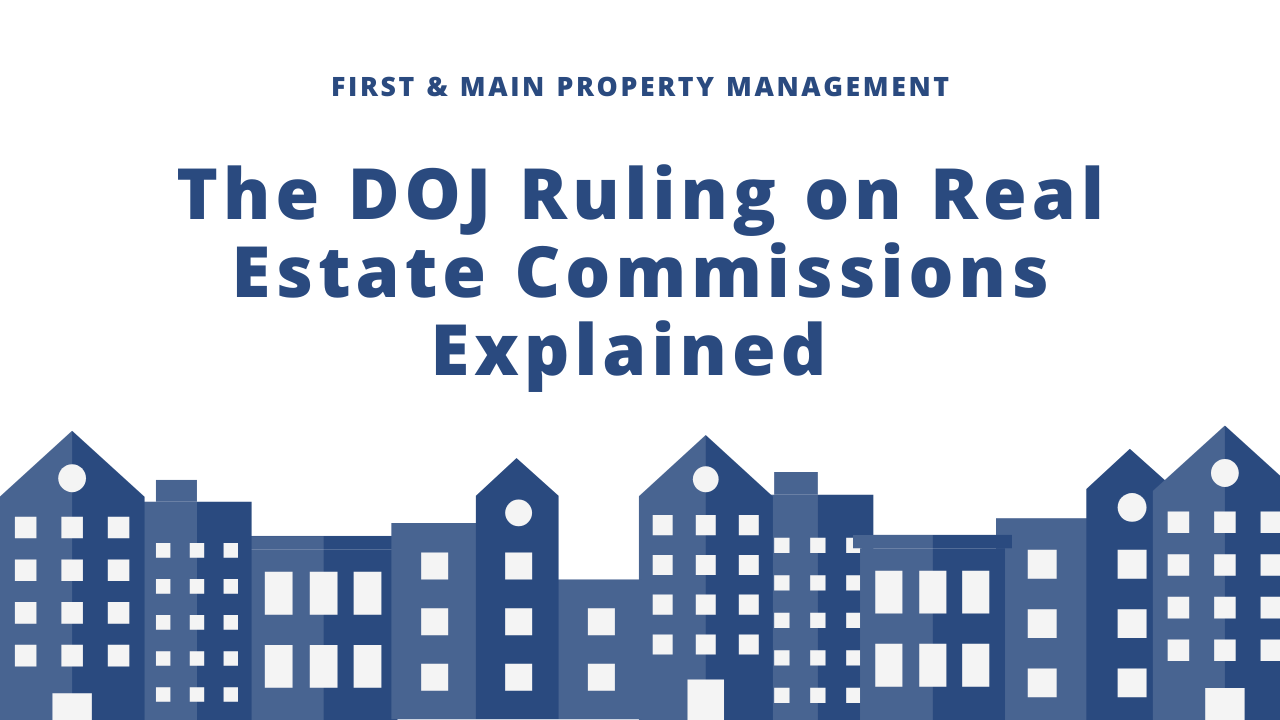The DOJ Ruling on Real Estate Commissions Explained

Key Takeaways
- Buyer-Agent Compensation: The DOJ ruling eliminates MLS-based buyer’s agent fees, requiring buyers to negotiate and pay agents directly.
- Buyer-Broker Agreements: Buyers must now sign agreements with agents before home tours, affecting commission negotiations for landlords.
- Landlord Implications: Landlords will face new commission structures, potentially leading to longer sales processes and the need for more direct negotiation.
How will changes to real estate commission structures impact property transactions and landlords?
The U.S. Department of Justice (DOJ) recently reached a settlement with the National Association of Realtors (NAR), reshaping how real estate commissions are structured and disclosed.
These changes, aimed at increasing transparency, could affect how buyers' agents are compensated. For landlords who buy or sell properties as part of their investment strategy, understanding these shifts is crucial.
That’s why First & Main Property Management has written this article, to help landlords stay informed and navigate these changes effectively, ensuring their investments remain protected.
Keep reading to learn more!
Background of the DOJ Ruling
The DOJ alleged that NAR’s long-standing commission structure led to higher costs for buyers and sellers by limiting competition. Traditionally, sellers would offer commissions to buyers' agents through Multiple Listing Services (MLS).
This practice made it appear as though the buyer’s agent was free for the buyer when, in reality, the commission was often built into the home’s price. The DOJ argued that this structure restricted competition and forced consumers to pay higher fees without full transparency.
To address these concerns, the DOJ and NAR reached a settlement that requires significant changes to real estate commission practices.
Key Changes Implemented
Here are some key changes:
Removal of Buyer’s Agent Compensation in MLS Listings
One of the most notable changes is that real estate agents will no longer be able to offer compensation to buyers' agents through MLS listings.
Previously, listing agents could advertise how much a seller was willing to pay a buyer’s agent. Under the new rules, this information must be handled outside the MLS.

This change is expected to encourage more direct negotiations between buyers and their agents. Buyers may need to negotiate and directly pay for their agent’s services rather than relying on the seller to cover those costs.
This could create a shift in how buyers choose agents, as they may look for lower-cost services or alternative transaction models, such as flat-fee arrangements.
Mandatory Written Buyer-Broker Agreements
Another major change requires buyers to enter into a written agreement with their real estate broker before viewing homes. This agreement will clearly define the agent’s compensation and ensure that buyers understand their financial obligations from the beginning.
For landlords, this means that prospective buyers who tour investment properties will likely have pre-established agreements with their agents. It also means that landlords selling properties may encounter different commission negotiations than before.
Some buyers may seek to negotiate reduced commissions or explore alternative
brokerage models to lower costs.
Implications for Buyers and Sellers
Here are some implications for buyers and sellers:
Impact on Buyers
Buyers will now be responsible for negotiating their agent’s commission. In some cases, this could result in buyers paying their agents directly, rather than relying on sellers to include commissions in the sale price.
This could lead to a shift where buyers look for more affordable agent services or handle more of
the buying process independently. Additionally, buyers may become more selective when choosing real estate agents, favoring those who offer flexible commission structures or rebates.
This change could lead to increased competition among agents, ultimately reducing overall commission rates.

However, it could also mean that inexperienced buyers struggle to afford quality representation, potentially leading to more complex negotiations and transactions.
Impact on Sellers
For landlords selling properties, these changes could alter how
commissions are structured. Sellers may no longer automatically offer a commission to the buyer’s agent, which could change how competitive their property appears to buyers using agents.
However, sellers can still negotiate commissions outside of MLS platforms. Additionally, because buyers will have to pay their agents directly, some may seek to negotiate lower purchase prices to offset their costs.
This could influence property values and the overall negotiation process.
Sellers who are accustomed to negotiating with buyers' agents as part of the deal may find that transactions take longer or require more direct involvement in commission discussions.
Additional Considerations for Landlords
Landlords who frequently buy and sell properties must adapt to these changes by reconsidering how they structure their real estate transactions. Some may choose to work with discount brokerages or explore new ways to market properties to buyers without relying on traditional agent structures.
Another key consideration is how these changes affect
rental property investments. If commission costs shift to buyers, it could lead to slower property sales, especially in competitive markets where buyers are already stretching their budgets.
Landlords looking to sell properties should plan for potentially longer negotiation periods and increased buyer scrutiny regarding commissions. Furthermore, landlords who rely on
real estate professionals to acquire investment properties should assess their agent relationships.

If agents begin charging buyers directly, landlords who frequently purchase properties may need to factor in additional commission expenses that were previously covered by sellers.
Understanding new fee structures and negotiating commission rates upfront will be critical.
How First & Main Property Management Can Help
Navigating these new commission structures can be challenging, especially for landlords who regularly buy and sell investment properties. First & Main Property Management offers expert guidance to help landlords understand how these changes affect their real estate transactions.
Our team ensures that you remain informed about market trends and commission negotiations, so you can make the best financial decisions for your investments.
We also provide comprehensive property management services that allow landlords to focus on maximizing returns while we handle leasing,
tenant relations, and property maintenance.
Our experience in the industry enables us to offer insights into market shifts, ensuring that your rental investments remain competitive despite changing commission structures.
Bottom Line
The DOJ's ruling on real estate commissions will drive greater transparency and competition in the market. With changes like eliminating MLS-based buyer’s agent compensation and requiring written agreements, transactions may look different moving forward.
For landlords, this means new financial negotiations when buying or selling properties. Understanding these shifts is crucial for making informed decisions and maintaining profitability.
First & Main Property Management is here to help you navigate these changes. Contact us today to learn how we can support your real estate needs.












